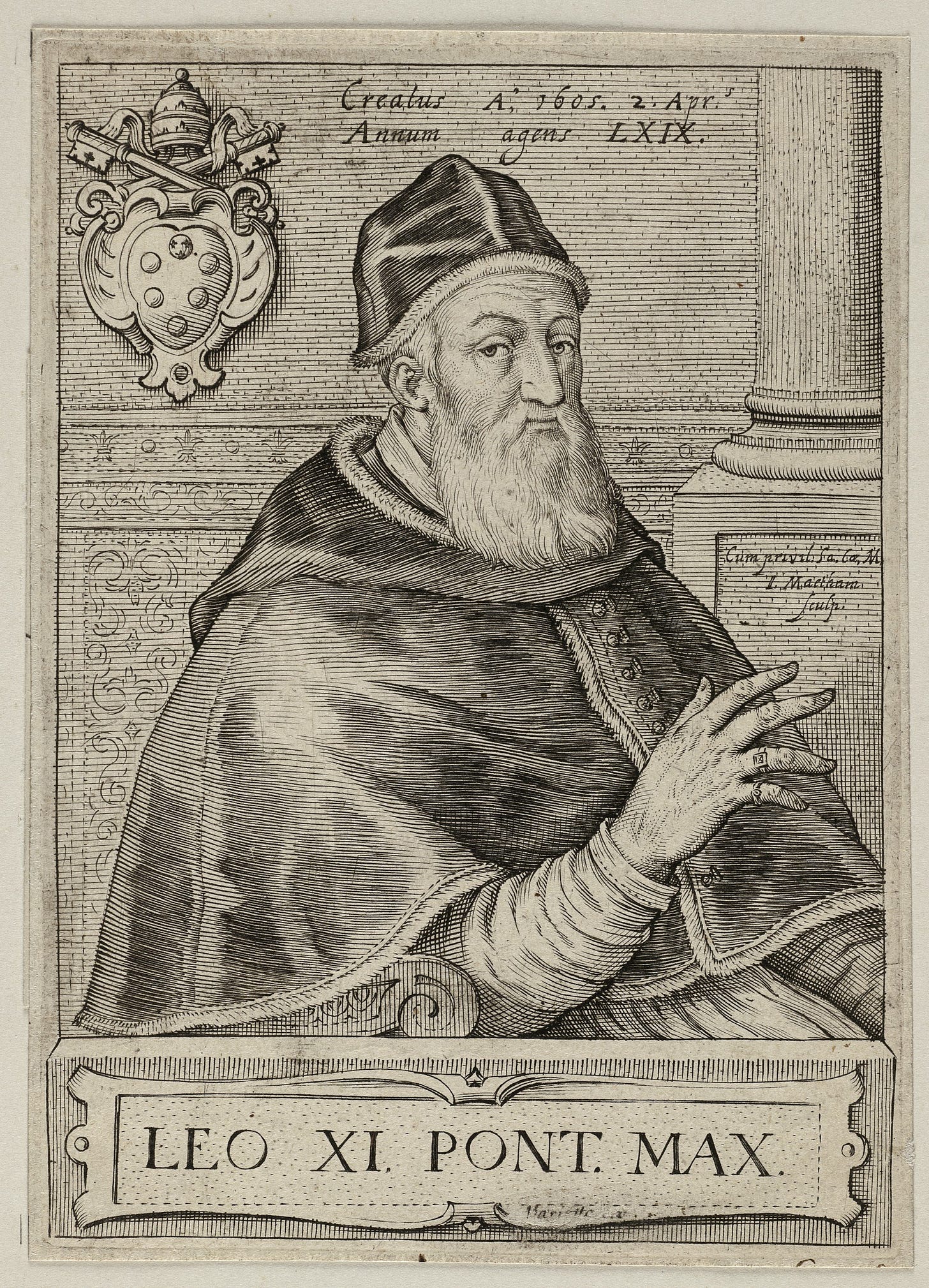Leo XI: The Lightning Pope
The Eleventh of the Leos | Pope Leo XI (April 1–April 27, 1605 AD)
“For here we have no continuing city, but we seek one to come.”
— Hebrews 13:14, Douay-Rheims
Some popes reign for decades; others for days.
In April of 1605, the Chair of Peter was filled by a man who had long resisted it, Alessandro Ottaviano de’ Medici, a cousin of Leo X, who took the name Leo XI. His pontificate lasted a mere twenty-seven days, yet his life before the tiara was marked by gentleness, fidelity, and pastoral devotion.
Leo XI was called “Papa Lampo” — “the Lightning Pope” — because his reign flashed briefly and was gone. But even a lightning flash can illuminate the sky.
From Florence to Rome: A Reluctant Shepherd
Alessandro de’ Medici was born in Florence in 1535, into a noble family deeply tied to both Church and state. Unlike his illustrious ancestor Leo X, he was not drawn to splendor or politics. He loved prayer, learning, and the quiet work of mercy.
He served the Church faithfully under several popes and became known for his integrity and humility. In 1569, he was appointed Archbishop of Florence, where he spent nearly three decades reforming the clergy, strengthening discipline, and caring for the poor, earning the affectionate title “Father of the Poor.”
Pope Clement VIII later made him a cardinal and entrusted him with delicate diplomatic missions, including one to France, where he helped heal wounds after years of religious war. His patience and tact earned him the respect of kings and clergy alike.
Election and Reluctance
When Clement VIII died in March 1605, the conclave was divided among factions loyal to Spain and France. Alessandro, then seventy years old and in frail health, was seen as a compromise candidate, pious, elderly, and unlikely to reign long enough to shift the balance of power.
He was elected on April 1, 1605, taking the name Leo XI in honor of Leo X, his Medici forebear. But unlike the worldly Medici pope of the Renaissance, Leo XI’s heart was ascetic.
Upon his election, he wept and said quietly:
“God forgive you — what have you done?”
It was the cry of a man who knew the papacy not as a crown, but as a cross.
A Pope Who Would Not Compromise Truth
Despite his short reign, Leo XI revealed remarkable courage. He resisted political pressure from King Henry IV of France, refusing to grant concessions that would undermine papal independence.
He sought to reform the Curia and curb clerical abuses, even as his health declined rapidly. The burden of the office, combined with the fatigue of his coronation and duties, soon overwhelmed him.
After only twenty-seven days, he collapsed from exhaustion and died on April 27, 1605.
His reign was short, but it was not empty. It was a testimony that holiness does not need time to bear fruit.
The Lightning That Revealed the Cross
It is easy to dismiss Leo XI as a footnote in papal history, a name between giants. But in his brief papacy, one sees a lesson radiant in its simplicity: that the measure of a pope, like that of a saint, is not in duration but in devotion.
Leo XI showed that even a fleeting moment, lived in complete obedience to God, can reveal eternity.
Where Leo X embodied the worldly splendor of the Medici name, Leo XI sanctified it with humility. His papacy was a whisper of grace between storms.
“The days of man are as grass, as the flower of the field so shall he flourish. For the spirit shall pass in him, and he shall not be.”
— Psalm 102:15–16, Douay-Rheims
We are not given long to reign, not popes, not princes, not common men. What matters is that, in whatever days we have, we rule ourselves by grace.
The Flash of Holiness
The world remembers Pope Leo XI for the brevity of his reign. But perhaps brevity was his message. In a Church recovering from the tumult of the Reformation, his stillness, his simplicity, his purity of conscience stood as a quiet flame amid political intrigue.
His papacy was like lightning, brief, but bright enough to remind Rome that sanctity, not power, is the true light of Peter’s Chair.
He left no encyclicals, no grand monuments, no councils. Only the witness of a gentle soul, faithful to the end.
And sometimes, that is enough.


